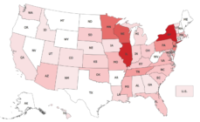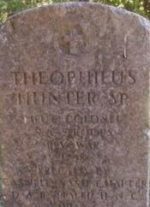 When the Air Quality Division of the Indiana Department of Environmental Management (IDEM) announced a proposal last year to move all of its public notice advertising from newspapers to its own website, its motivation for doing so was clear: Bureaucratic efficiency.
When the Air Quality Division of the Indiana Department of Environmental Management (IDEM) announced a proposal last year to move all of its public notice advertising from newspapers to its own website, its motivation for doing so was clear: Bureaucratic efficiency.
“(IDEM’s) proposal never even bothers to claim e-notice will reach more Indiana citizens,” PNRC noted in the comments we filed opposing the plan. “It focuses instead on cost, convenience and expedience. Those are all worthy goals. Unfortunately, none are the primary purpose of public notice laws.”
The Year in Public Notice Legislation
 Despite a bit of early angst in a few states, 2018 ended up being a relatively benign year for public notice.
Despite a bit of early angst in a few states, 2018 ended up being a relatively benign year for public notice.
PNRC has tracked about 160 separate public notice bills this year, just a bit more than in 2017. Only 24 were enacted into law and most were vanishingly minor. As is generally the case with minor public notice legislation, almost all of the notice changes were incidental to the primary focus of the legislation. For example, a bill in New Jersey added several new instances of both newspaper and government website notice in connection with public-private partnership agreements for certain building and highway infrastructure projects.
PNRC, NNA Meet With Federal Agency to Discuss Proposal
 PNRC Executive Director Richard Karpel met last month with Federal Communications Commission (FCC) officials to urge the agency to abandon its proposal to eliminate rules requiring broadcasters to publish notices in local newspapers when they file license applications with the Commission. National Newspaper Association (NNA) general counsel Tonda Rush joined him at the meeting.
PNRC Executive Director Richard Karpel met last month with Federal Communications Commission (FCC) officials to urge the agency to abandon its proposal to eliminate rules requiring broadcasters to publish notices in local newspapers when they file license applications with the Commission. National Newspaper Association (NNA) general counsel Tonda Rush joined him at the meeting.
The FCC proposal, which was filed in October 2017, is open-ended. Potential outcomes range from elimination of all public notice requirements — the preference of the broadcasters’ association — to maintenance of the existing rules. However, dismissive comments expressed by FCC Chairman Ajit Pai and a fellow commissioner don’t bode well for their prospects.
Voters Go to the Polls to Select Official Newspapers in N.D.
See the post-election postscript at the end of this post.  If we had a category in our annual Public Notice Journalism Contest for best lede, Jack Dura of the Bismarck Tribune would probably win with this one: “Races for official county newspaper don’t usually headline election years, but a few papers around North Dakota could flip in this cycle.”
If we had a category in our annual Public Notice Journalism Contest for best lede, Jack Dura of the Bismarck Tribune would probably win with this one: “Races for official county newspaper don’t usually headline election years, but a few papers around North Dakota could flip in this cycle.”
It turns out that in North Dakota, when a county has at least two newspapers local voters often get to decide which one is designated to serve as the official publisher of notice. It appears to be the only state that designates official newspapers by ballot.
Newspaper Notice Helps Save County’s Oldest Grave
 Theophilus Hunter was a big deal in Wake County, North Carolina, and in Raleigh, the county seat. A Revolutionary War leader who owned a popular lodge in the area and held official posts in both the city and county, Hunter is considered a local founding father by some residents. When he died in 1798, he was buried in an area that is now close to the N.C. State University campus.
Theophilus Hunter was a big deal in Wake County, North Carolina, and in Raleigh, the county seat. A Revolutionary War leader who owned a popular lodge in the area and held official posts in both the city and county, Hunter is considered a local founding father by some residents. When he died in 1798, he was buried in an area that is now close to the N.C. State University campus.
It will remain there for now, along with the 17 unmarked graves, as a result of a public notice published in Raleigh’s News & Observer.
Newspaper Notice Saves County “Tens of Thousands of Dollars”
 CVS Caremark recently charged Wapello County, Iowa, $198.22 for a bottle of generic antipsychotic pills dispensed by a local pharmacy. CVS reimbursed the pharmacy just $5.73 for the pills.
CVS Caremark recently charged Wapello County, Iowa, $198.22 for a bottle of generic antipsychotic pills dispensed by a local pharmacy. CVS reimbursed the pharmacy just $5.73 for the pills.
We know about this enormous markup because one of the owners of the pharmacy, Mark Frahm, read a public notice in the local Ottumwa Courier and did some sleuthing. Frahm’s investigation ultimately had a significant impact that continues to reverberate. Locally, it led the county jail to drop CVS as its pharmacy benefit manager (PBM) and purchase meds directly from Frahm’s South Side Drug. The move is “expected to save the county tens of thousands of dollars,” according to the Courier.
County Learns to Rely on its Newspaper, Not a Government Website, For Public Notice
 The proof that public notices published in newspapers are more effective than those that are posted on government websites doesn’t get any more direct and conclusive than this.
The proof that public notices published in newspapers are more effective than those that are posted on government websites doesn’t get any more direct and conclusive than this.
Last year, the jail in Ford County, Ill. needed a new generator. The sheriff put a bid-solicitation notice on the county website. It isn’t clear whether the notice got a response, but the sheriff later asked the county’s Public Building Commission to approve a $72,576 bid for a generator. The Commission initially approved the expenditure but rescinded the approval when it learned the sheriff hadn’t published a notice in a local newspaper, as state law requires.
Broadcasters Ask FCC to Move Notices to Their Websites
 Late last year, the Federal Communications Commission (FCC) issued a proposal that would, among other things, eliminate its current rules requiring broadcasters to publish notices in local newspapers when they file various license applications. PNRC filed comments opposing the change.
Late last year, the Federal Communications Commission (FCC) issued a proposal that would, among other things, eliminate its current rules requiring broadcasters to publish notices in local newspapers when they file various license applications. PNRC filed comments opposing the change.
More than nine months later, the agency still hasn’t issued a final ruling on its proposal.
But the National Association of Broadcasters (NAB) isn’t content to wait. In August, the Washington, D.C.-based trade association filed an ex parte notice suggesting an alternative: If the FCC decides not to kill all public notice when its members file license applications — which is NAB’s preference — then the agency should replace newspaper notice with a rule permitting “broadcasters to make brief on-air announcements that refer audiences to websites with additional information.”
Newspaper Notices Activate Opposition to Oil Drilling Proposal
 A privately held oil company with an interest in limiting public input on its requests to change New Mexico’s drilling rules faces opposition from local environmentalists who learned about the company’s latest proposal from notices published in their local papers.
A privately held oil company with an interest in limiting public input on its requests to change New Mexico’s drilling rules faces opposition from local environmentalists who learned about the company’s latest proposal from notices published in their local papers.
Texas-based Hilcorp Energy Co. is petitioning the New Mexico Oil Conservation Commission (OCC) to allow it to double the number of wells it operates in San Juan and Rio Arriba counties. Local activist Mike Eisenfeld learned about the proposal when he read a public notice in the Farmington Daily Times in late August, according to NMPolitics.net. The notice also ran in the Rio Grande Sun on the Friday before Labor Day, and “opponents were left scrambling to organize and formally object to the move within a seven-day deadline,” San Juan County cattle farmer Don Schreiber told the Sante Fe New Mexican.
U.S. Senator: “Paper is not antiquated. It’s reliable.”
 As policymakers have long understood, one of the key elements of a valid public notice is archivability. Notices must be capable of being permanently stored in their original, unaltered form to serve as historical records for the judicial system, scholars and historians. Newspapers do a good job at that. Websites do not.
As policymakers have long understood, one of the key elements of a valid public notice is archivability. Notices must be capable of being permanently stored in their original, unaltered form to serve as historical records for the judicial system, scholars and historians. Newspapers do a good job at that. Websites do not.
Late last year, Sen. James Lankford, R-Okla., introduced a bill that reminds us of the important role historical records still play in sustaining our democracy. Sen. Lankford’s Secure Elections Act, which is designed to harden U.S. defenses against interference in federal elections, was co-sponsored by senators from both parties spanning the ideological spectrum; it appears to have widespread support within the upper chamber.
Newspaper Notice Drives Interest in Used Fire Truck
 Who could possibly want to buy a used fire truck with a rusted frame, leaking fuel tank, no rear seats and broken springs in all four of its tires?
Who could possibly want to buy a used fire truck with a rusted frame, leaking fuel tank, no rear seats and broken springs in all four of its tires?
Much to the surprise of a new fire chief on Cape Cod, there are many potential buyers and they learned about the availability of the truck from a small public notice in the Sandwich (Mass.) Enterprise. The notice sought bids of at least $5,000 for the Sandwich Fire Department’s 2007 Sutphen Fire Engine; it was published 11 days ago in the Enterprise by Fire Chief John J. Burke.
